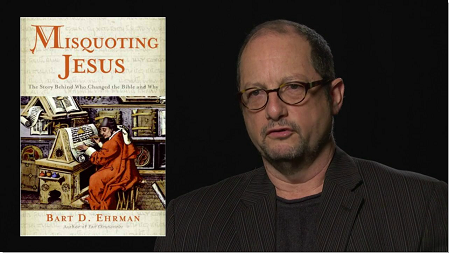|
Word Gems
exploring self-realization, sacred personhood, and full humanity
Prof. Bart D. Ehrman
|
II Timothy 3:16 asserts that “all scripture is inspired by God (literally, “God-breathed”). If this is true, then how could there be forged documents in the canon or mistakes of any kind? But this dogmatic pronouncement of inerrancy, itself, comes to us in a forged document and, like the Wizard of Oz who shouted “Don’t look behind that curtain!”, issues as self-serving Orwellian propaganda and fake-news effort.
|
return to the main-page article on "Bible"
|
Editor's prefatory comment:
Dr. Ehrman explains that the 5700 early copies of the New Testament – copies of copies of copies – contain hundreds of thousands of discrepancies.
Many of these are inconsequential but a significant number alter the meaning of the text in important ways. Most of these constituted mere human error in copying but some of them, it appears, were purposefully injected into the text by editorial judgment of scribes.
This entire area of scholarship is far more complex than most realize, leading the objective reviewer to understand that, in many cases, we have no knowledge of the original text of the New Testament.
In addition to Dr. Ehrman’s books, his lectures are available on youtube; for example: https://www.youtube.com/watch?v=pfheSAcCsrE&t=12s

|
Dr. Ehrman speaks of this in his book, "Forged: Writing In The Name Of God."
“When I was a good conservative evangelical Christian at Moody Bible Institute in my late teen years, I knew for a fact that there could not be any forgeries in the New Testament.
“My view of Scripture was deeply rooted in Scripture itself and above all in that classic statement of the Bible’s own inspiration, 2 Timothy 3:16: ‘All Scripture is inspired by God [literally, ‘God-breathed’]…
Editor’s note: I’d trodden a similar path. Looking back now I see that when one is held firmly in cultish beliefs, one does not see the contradiction and the circular reasoning. We believe in the infallibility of a Book because it tells us to do so!? Does anyone see a problem with this reasoning?
I’m reminded of the line in Don McLean’s “American Pie”:
Did you write the book of love
And do you have faith in God above
If the Bible tells you so?

"Don't look behind that curtain!"
|



